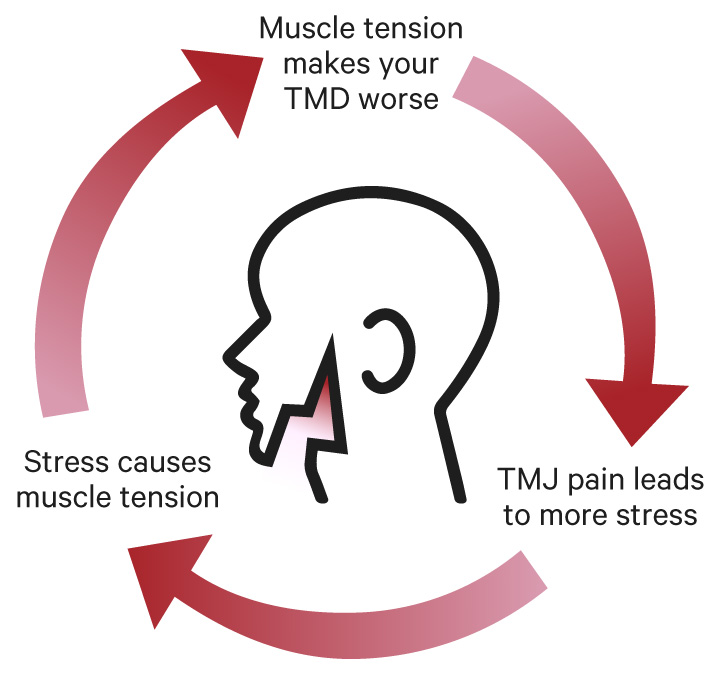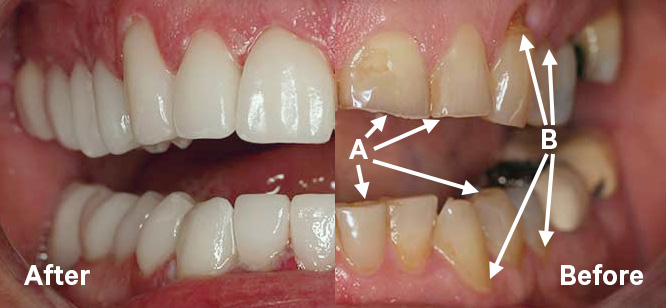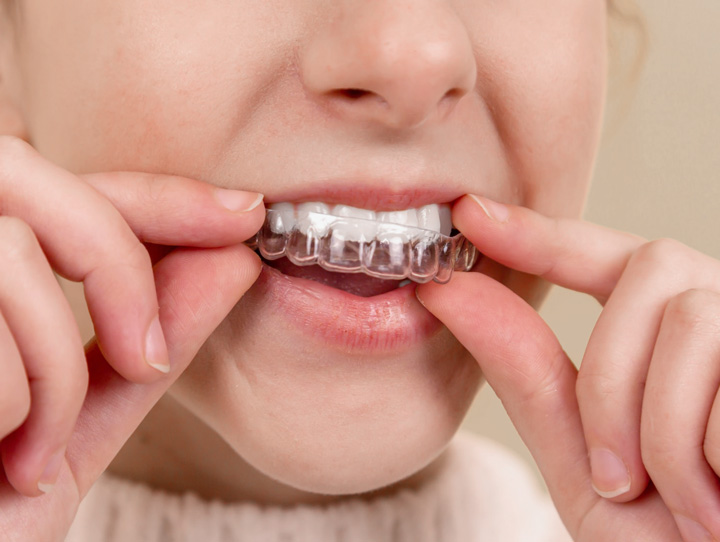Everyone experiences stress at some point in their day-to-day life. However, did you know that chronic stress can damage your teeth? Stress can cause you to clench your jaw or grind your teeth. And doing this habitually can lead to a condition called temporomandibular joint dysfunction (also called temporomandibular disorder, or TMD). The pain and complications associated with this disorder can then cause more stress. So often, stress and TMD go hand-in-hand.
Dealing with chronic jaw stiffness and pain can be stressful. Not only can a proper diagnosis be tricky to determine, but your pain symptoms aren’t always limited to your jaw. And, the problem is that stress itself can make matters worse.
For example, stress can cause muscles and joints to tighten, which can stiffen your jaw even further. To keep your teeth and jaw healthy, we recommend visiting a dental professional. This is because jaw stiffness and pain can be a sign of TMD. And this is a serious condition that can lock your jaw in place and damage teeth.
How TMJ pain can lead to many more problems
Your temporomandibular joints (also called TMJ) are the pivot points for your jaw. And the muscles surrounding those joints are responsible for moving your jaw. These joints are active whenever you chew, speak, laugh, drink, yawn, or breathe through your mouth.
Because it is constantly active, you are likely to experience pain or problems with your TMJ from time to time. However, chronic TMJ pain can lead to serious complications. For example, it can lead to pain every time you use your TMJ. This means pain while chewing, talking, or even laughing. Additionally, you can wear down, chip, or crack your teeth due to constant jaw clenching or teeth grinding.
This chronic TMJ pain is called temporomandibular joint disorder (shortened to TMD). And while it is clear that TMD can cause problems in your mouth, it can also cause pain symptoms elsewhere. The muscles in your body are interconnected, so TMD can lead to a host of other issues, including:
Toothaches and chipped teeth
Neck and shoulder pain and stiffness
Earaches and tinnitus (ringing in the ears)
Headaches and migraines
Pain in your upper back
Jaw stiffness or even lockjaw
A mentioned, without treatment minor jaw stiffness can lead to significant pain and complications. Thankfully, Dr. Patel and the staff at Infinite Smiles on Powell, OH are highly skilled at diagnosing and treating TMD.
The stress & TMD cycle
TMD and your pain symptoms can be made worse by stress. This is because stress can start a vicious cycle. Simply, when you’re under a lot of stress, you tighten your body up, and your muscles become tense. When you have TMD, a lot of this tension is held in your jaw. And if your muscles hold their tension for too long, it can lead to general aches and pains and headaches and migraines. These aches and pains can lead to further stress, which can aggravate your TMD even further.

Simply, this cycle can continue until the symptoms and pain become unbearable. At our office, we want to help you before this cycle spirals out of control.
Complications with bruxism & TMD
TMD is commonly associated with bruxism. This is a disorder that occurs when you habitually clench or grind your teeth, either through stress or malocclusion. When you are stressed, tension can build in your jaw, making the muscles rigid and press tighter together. Alternatively, malocclusion (misaligned bite) can train your jaw to grind. This is because your jaw is constantly shifting around trying to find a comfortable position to rest. If you unconsciously grind or clench your teeth either during the day or at night, you may suffer from bruxism.
This forceful grinding puts a large amount of strain on both your teeth and jaw. First, habitual tooth grinding gradually wears down enamel which weakens your teeth. The weakened teeth then become more prone to decay and further damage. Second, sustained pressure on your teeth can reduce blood flow in your gums. This makes you more prone to gum recession and periodontitis. Third, the increased pressure on your jaw can damage your TMJ and cause muscle stiffness and soreness. These together can easily complicate your TMD and make your symptoms worse.

In general, TMD is a complex disorder because it can be difficult to diagnose and treat. If you are suffering from bruxism, it can simply complicate the issue. Dr. Neal Patel has the expertise to recognize the symptoms of both bruxism and TMD. This means we can help you find the relief you need much sooner.
Solutions for your TMD & bruxism
The first step to relief from your pain is providing a proper diagnosis. Because the pain symptoms are variable, TMD can be difficult to diagnose. So, if you suffer from TMD, you likely have been feeling its effects for a while. This can be frustrating, especially if you’ve been to multiple doctors and no one can seem to find a solution.
Instead of relying on guesswork, the dentists at our Powell, Ohio office have the tools for a decisive diagnosis. At your appointment, we utilize the BioPak jaw diagnostic system. This tool measures the health of your jaw joints and facial muscles to pinpoint problem areas.
As a result, we get an accurate picture of your TMD. We then can use that to prescribe the best treatment plan for you. And, we can provide several ways to properly treat your TMJ pain:
Botox®
Approved by the FDA as an effective treatment, Botox can be safely used to relax your muscles. By using it on the muscles surrounding your TMJ, you can help them calm down and begin to heal normally. This can reduce tension that triggers frequent migraines and headaches.
Custom-fit nightguard
Bruxism can place extra stress on your jaw joints and complicate your TMD. Because of this, it is important to treat bruxism along with your TMD. In order to treat both, we custom-fit a nightguard for you to wear over your teeth as you sleep. This guard helps to realign your jaw and take pressure off your TMJ. As a result, you suffer less pain, your jaw does not clench and grind, and your TMJ heals.
Ultra thin daytime guard
This solution is similar to a nightguard. But, instead of wearing it only at night, the day guard can be worn all day long. This invisible, thin guard repositions your jaw during the day and takes pressure away from your TMJ. It prevents bruxism and reduces jaw pain by allowing your TMJ time to rest and heal.

How Dr. Patel can reduce your TMJ pain
Dr. Neal Patel is here for you. Whether it is TMD or another dental issue, we will help diagnose the source of your chronic pain. In any event, our team has the tools and expertise to gain clear insight to your dental health.
If you are suffering from chronic headaches or TMJ pain, call our office at 740.881.2600 to schedule your appointment today. Or, schedule your appointment online, anytime. We look forward to providing you with the highest quality dental care available. Soon, you could enjoy complete relief from your chronic pain and soreness.
